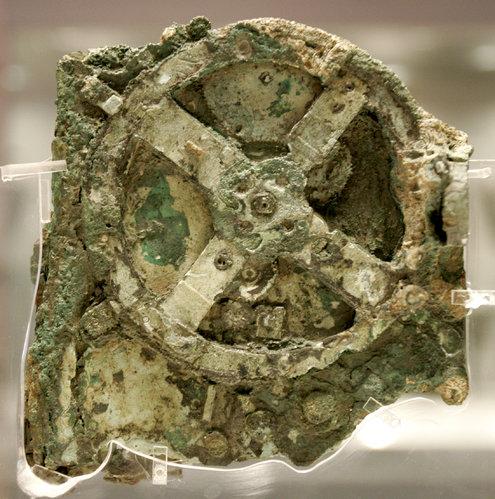John Markoff
Source - http://www.nytimes.com/2014/11/25/science/solving-the-riddles-of-an-early-astronomical-calculator.html

Part of the Antikythera Mechanism, above, an astronomical calculator raised from a shipwreck in 1901. ,Credit Thanassis Stavrakis/Associated Press
A riddle for the ages may be a small step closer to a solution: Who made the famed Antikythera Mechanism, the astronomical calculator that was raised from an ancient shipwreck near Crete in 1901?
The complex clocklike assembly of bronze gears and display dials predates other known examples of similar technology by more than 1,000 years. It accurately predicted lunar and solar eclipses, as well as solar, lunar and planetary positions.
For good measure, the mechanism also tracked the dates of the Olympic Games. Although it was not programmable in the modern sense, some have called it the first analog computer.
Archaeologists and historians have long debated where the device was built, and by whom. Given its sophistication, some experts believe it must have been influenced, at least, by one of a small pantheon of legendary Greek scientists — perhaps Archimedes,Hipparchus or Posidonius.
Its purpose has been debated, too. It has been described as, among other things, an eclipse predictor, an astrological forecasting system and an astronomical teaching device.
Now a new analysis of the dial used to predict eclipses, which is set on the back of the mechanism, provides yet another clue to one of history’s most intriguing puzzles. Christián C. Carman, a science historian at the National University of Quilmes in Argentina, and James Evans, a physicist at the University of Puget Sound in Washington, suggest that the calendar of the mysterious device began in 205 B.C., just seven years after Archimedes died.
The mechanism was most likely housed in a wooden box and operated by a hand crank. The device itself bears inscriptions on the front and back. In the 1970s, the engravings were estimated to date from 87 B.C. But more recently, scientists examining the forms of the Greek letters in the inscriptions dated the mechanism to 150 to 100 B.C.
Writing this month in the journal Archive for History of Exact Sciences, Dr. Carman and Dr. Evans took a different tack. Starting with the ways the device’s eclipse patterns fit Babylonian eclipse records, the two scientists used a process of elimination to reach a conclusion that the “epoch date,” or starting point, of the Antikythera Mechanism’s calendar was 50 years to a century earlier than had been generally believed.
The finding supports the idea, scientists said, that the mechanism’s eclipse prediction strategy was not based on Greek trigonometry, which did not exist at the time, but on Babylonian arithmetical methods borrowed by the Greeks.

A digital image of the surface inscriptions on the Antikythera Mechanism.
Over the years scientists have speculated that the mechanism might have been somehow linked to Archimedes, one of history’s most famous mathematicians and inventors. In 2008, a group of researchers reported that language inscribed on the device suggested it had been manufactured in Corinth or in Syracuse, where Archimedes lived.
But Archimedes was killed by a Roman soldier in 212 B.C., while the commercial grain ship carrying the mechanism is believed to have sunk sometime between 85 and 60 B.C. The new finding suggests the device may have been old at the time of the shipwreck, but the connection to Archimedes now seems even less likely.
An inscription on a small dial used to date the Olympic Games refers to an athletic competition that was held in Rhodes, according to research by Paul Iversen, a Greek scholar at Case Western Reserve University.
“If we were all taking bets about where it was made, I think I would bet what most people would bet, in Rhodes,” said Alexander Jones, a specialist in the history of ancient mathematical sciences at New York University.
Dr. Evans said he remained cautious about attempting to identify the maker at all.
“We know so little about ancient Greek astronomy,” he said. “Only small fragments of work have survived. It’s probably safer not to try to hang it on any one particular famous person.”
Since new information began to emerge about the Antikythera Mechanism in 2006, it has been the source of several books, replicas and computer simulations, even a Lego model. A growing research community of Greek scholars, archaeologists, astronomers and historians is chasing its secrets.
Last fall, an expedition led by Woods Hole and Greek government scientists began the first systematic, scientific investigation of the site of the shipwreck where the mechanism was found. The dive was shortened to just five days because of bad weather, but the scientists plan to return next spring.